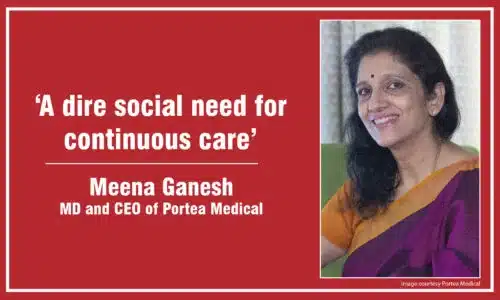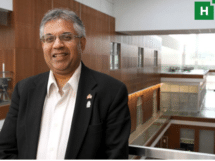In less than a decade of its operations, Bengaluru-based startup Portea Medical has revolutionised the home healthcare space in India. Jisha Krishnan in conversation with MD and CEO of Portea Medical Meena Ganesh.
As India’s largest and fastest-growing home healthcare company, Portea Medical represents a model of care that can significantly reduce the growing burden on hospitals as well as cut down on medical expenses for patients. Since its inception in 2013, the Bengaluru-based startup has revolutionised the home healthcare space in India by introducing a range of chronic disease management, post-operative care, geriatric, primary as well as allied services, making healthcare affordable and convenient.
According to the World Health Organisation (WHO), India has only 0.9 hospital beds for every 1,000 Indians. The recommended number is 1.9 beds per 1,000 population. “Healthcare needs a lot of disruption,” avers Meena Ganesh, MD and CEO of Portea Medical, as we catch up at her office on a pleasant Friday morning. My colleagues from Delhi are surprised to find that the non-descript office building in Domlur is a far cry from the cool startup workspaces that Bengaluru has gained a reputation for.
The serial entrepreneur, though, was everything we expected her to be and more! With almost three decades of experience in the healthcare, consulting, technology, outsourcing, education and e-commerce spaces, Meena (along with her entrepreneur husband Ganesh) is all set to take the home healthcare industry in India – projected to reach $ 6.2 billion by 2020 – to greater heights. Edited excerpts from an interaction with the IIM Calcutta alumnus, who is also the Partner at GrowthStory, an entrepreneurship platform that promotes greenfield ventures:
What prompted you to start Portea?
A lot of healthcare needs lie outside of hospitals. However, not much investment or thought goes into how care is provided after one leaves the hospital. With my parents’ healthcare, we had great facilities at the hospitals, with access to the best of doctors. Yet, outside of that space, everything was a challenge. We saw that people don’t get the quality of care – even if they are willing to pay for it. There was a dire social need for continuous care.
Which are your focus areas right now?
There are four primary areas: Chronic disease management, post-operative care, working with elders, and primary care. We offer specific solutions – whether it’s for post-knee replacement or neuro rehab, or even setting up an ICU at home. We are constantly adding more capabilities, such as physiotherapy, nursing care, end-of-life care for terminally-ill patients. The elderly population in India is growing rapidly and we are working towards becoming their health managers. With nuclear families, it’s difficult for elders to manage their day-to-day healthcare needs as well as emergencies if any.
What are the major challenges?
Supply is the biggest challenge. There are not enough doctors and nurses. We created a category of nursing attendants for patients who need bedside care. In many cases, it’s not so much about medical expertise as care that is needed. Can technology, such as artificial intelligence (AI) robots, offer a solution? Technology is very important. Portea’s connected care platform makes remote monitoring possible and drives the availability of hospital-like care at home in critical care cases. In chronic disease management, like diabetes, for instance, smart glucometers empower patients with data that aids in lifestyle management. However, AI bots may not be the solution for a country like India, where human resource availability is not an issue.
Can home healthcare address mental health needs?
While it’s good that we are talking about depression in youngsters, I feel that depression in elders is ignored! There’s definitely a need for mental health delivery, but we haven’t looked at a business model yet. It will take some time for it to become a commercially viable business. What would you like the government to do to improve India’s healthcare scenario? The piece that is missing is primary care. Everybody wants to visit a specialist, even when it’s not required. The government needs to do more at the policy level to make primary healthcare more accessible. While Ayushman Bharat focuses on surgeries in hospitals, it’s important to include post-operative care and elderly care in healthcare insurance. That’s where people spend most of their money! We need to expand insurance coverage to the home healthcare sector.
What’s next for Portea?
Currently, Portea does 120,000 home visits a month across 16 locations in India. There are 4000 people working with us…We have just about scratched the surface. We are continuously improving not only the quality of our services but also percolating the overall quality of care across the industry. We have got accreditation standards in place. As one of the early players, we know that competition is good, as it creates more credibility for our offerings. Healthcare is a very regional, broad-based, and highly underserved sector. We are in it for the long-haul.
Any word at advice for healthcare startups?
Look at where the shoe is pinching!


















Add Comment